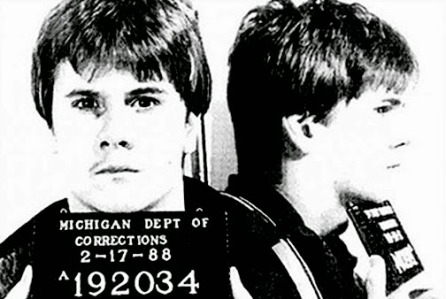Genre: Biopic
Premise: At age14, Richard Wersche Jr. became an informant for the FBI. He spent the next two years helping take down the biggest drug gang in Detroit, Michigan.
About: There are THREE “White Boy Rick” projects in development, although this one, by most accounts, is the best of the bunch (so far). What’s interesting here (and a reminder for writers who like biopics but are afraid of copyright issues) is that writer-bros Logan and Noah Miller sold this as a spec. They didn’t have any rights to Wersche’s story. To be clear on that, nobody requires you to get the rights to a life in order to write a script about them. You can write the best biopic you can, and leave the “rights” issues to the production company and/or studio that buys the script. Logan and Noah Miller are probably best known for their 2013 indie film, Sweetwater, a Western that starred Ed Harris and January Jones.
Writers: Logan & Noah Miller
Details: 136 pages (undated – but the script went out in February of this year)
When not one, not two, but three production companies are all racing to make a movie about the same person, you figure that person’s life has to be pretty extraordinary. For that reason, I went into this screenplay with some high expectations. And you know what they say about high expectations?
It’s 1986 and 14 year-old Richard Wersche Jr. has the geographic lack of fortune to be born in one of the worst cities in America – Detroit. Detroit used to be the chest-puffed-out capital of the automobile industry. That is until the Japanese started making cars that were cheaper and better.
When that industry broke down, Detroit became a haven for gangs and drugs. But where there is chaos, there is opportunity. And Richard Wersche’s father got the idea to start selling guns to gangs. It’s not exactly legal, but it keeps food on the table. And who’s dad’s best employee? Wouldn’t you know it. It’s his son, little White Boy Rick.
One day Dad gets a knock on the door from the FBI. They know that if there’s anybody who’s got a beat on these gangs, it’s the man selling them guns. So they offer money to dad if he can give them the inside scoop. However, to their surprise, it isn’t Dad who knows everything about every customer, it’s his son, 14 year-old Rick.
As soon as the Feds realize that Rick’s a mini-Einstein, they employ him to infiltrate the drug community. This leads to Rick meeting the Curry Brothers, the number one dealers in the city, and three of the most dangerous motherfuckers you’ll ever cross paths with. The Curry Brothers like Rick. He’s an anomaly. A little white teenage brat who thinks he knows it all. That’s enough to embrace him and make him a key piece of the enterprise.
The movie then follows this little 14, then 15, then 16 year old kid as he’s pulled back and forth between the government and this gang, both of them taking advantage of and exploiting Rick. But Rick figures out a way to rise above it all. And when the Curry Brothers finally get caught with their hands in the crack jar, Rick’s there to take their place, becoming the biggest dealer in the city.
But then there’s no one left for the Feds to take down except for, ironically, the boy who got them there. So Rick is thrown into prison for the rest of his life, and not a single one of those Feds who used a minor to do their jobs ever got punished for it. Rick is still behind bars today, waiting for justice to be served to the men who took advantage of him.
I don’t know if White Boy Rick is a great script so much as it is a great real-life story. And this is what I keep telling you guys is the dirty little secret of screenwriting. If you find that awesome idea or that awesome character, the script will write itself.
I mean we have a 15 year-old taking down some of the biggest drug dealers in the country. He becomes a millionaire, making more money a month than, as he points out, the president of the United States. He ends up running the biggest cocaine trading pipeline between Miami and the Midwest. He’s used by both sides of the system. He USES both sides of the system. It’s no secret why three separate companies are rushing to turn this man’s story into a movie.
White Boy Rick also taught me that utilizing an “impending sense of doom” shouldn’t be limited to horror films. Here, the impending sense of doom is the main story element driving us to keep reading. We know that Rick can’t walk this line forever. Either the bad guys are going to figure out he’s playing them or the good guys are going to stop needing him, and when either of those things happen, he’s toast.
To that end, this script did a great job. I wanted to see how Rick would fall.
If the script has faults, though, it’s its unabashed desperation to land Scorsese as a director. Because Scorsese has made this film so many times now, what was once a unique product has become pure formula. Not unlike the “boy meets girl, boy loses girl, boy gets girl back” formula that drives a rom-com, the Scorsese Tragedy has its own familiar beats. And while Rick was an amazing character, you couldn’t help thinking of Goodfellas, or The Wolf of Wall Street, or Casino, when you read White Boy Rick. It almost feels like one of those scripts was chosen and these new words were simply pasted on top of the old ones, starting with the obligatory first act of pure main character voice over.
It’s a writing crutch we all fall back on. When we write a movie, the first thing we do is go back and watch all the similar movies to see what they did right. The problem with this approach is that, whether you’re aware of it or not, those story beats are seeping into your soul, and without you even realizing it, you’re soon copying those beats into your script. So sure, you may be doing what made that other movie work, but you’re doing so at the expense of originality. You need to deviate from the script sometimes, pun-intended.
Despite the familiarity of the formula, I’d still recommend this script because the title character is so freaking fascinating. You can’t believe this really happened. And the Millers did an excellent job of making Rick likable. This guy did some horrible things. He ran a drug organization that indirectly killed hundreds (maybe thousands) of people. Yet the Millers cleverly present Rick as the victim, the teenage boy who was taken advantage of by everyone in his life, even his own father.
And maybe that’s the lesson to take away from this. When you have an idea this good or a character this good, you can make a lot of mistakes in your script and the script still works. If you have a flimsy or light premise like, to use a random example, Enough Said (that rom-com with James Gandolfini and Julia Luis-Dreyfus), the tiniest mistake (a boring twist) could derail the entire story. White Boy Rick proves what happens when you have the ultimate subject. Much like Rick in real life, the script becomes bulletproof.
[ ] what the hell did I just read?
[ ] wasn’t for me
[x] worth the read
[ ] impressive
[ ] genius
What I learned: A common mistake I see in monologue-writing is the writer getting too wrapped up in what the character is trying to say, and then delivering an overly-rewritten on-the-nose monologue that’s boring as hell. Monologues are always more memorable when they’re unique, or, like a good story, deviate from the expected path. To that end, I loved this monologue in White Boy Rick. In it, one of the FBI agents asks Rick if he knows who Nancy Reagan is. Keep in mind that the point of the monologue is to convey how important it is (to both Rick and us) that the government win the war on drugs. Most writers would’ve written a very straight-forward dull message about how the war on drugs is destroying America and if they don’t do something soon, the fabric of the country will be permanently destroyed. Here’s how the Millers write it instead. AGENT TURNER: “Well, it turns out that the First Lady is very fucking angry these days. She’s so fucking angry that she’s declared war. A War on Drugs. You know what that really means? That means that if she doesn’t get what she wants, if she doesn’t win this fucking goddamn war, the President doesn’t get any pussy. She locks his dick out of her vagina. And that’s bad for the country. Hell, it’s bad for the whole fucking world. Because when the President of the United States of America ain’t getting laid, he gets really fucking frustrated, and the next thing you know the nukes start flying and we’re buried in World War III with the fucking Russians.”



